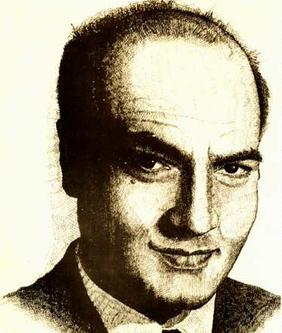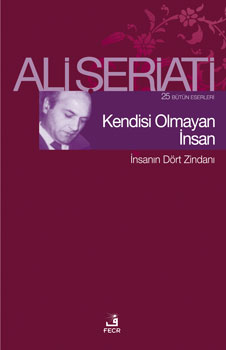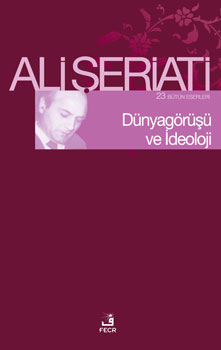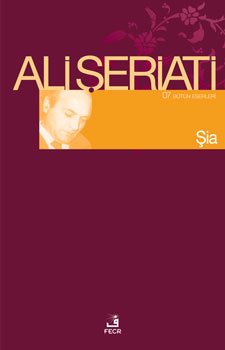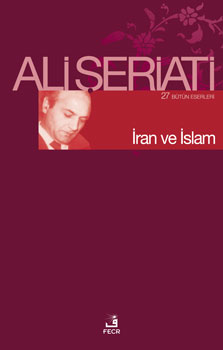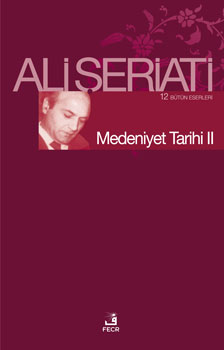
ALI SHARIATI: ISLAMIC FUNDAMENTALIST, MARXIST IDEOLOGIST AND SUFI MYSTIC.
Ali Shariati is widely recognized as the main ideologue of the Iranian revolution. To a reader of his varied works, Shariati presents a very complex and eclectic mix of ideas: traditional Muslim-Shi`a thought, radical Islamic fundamentalism, a mystical Sufi strand, Western existentialism, dialectical Marxism, and anti-imperialism.
IMPORTANCE OF ACTIVIST IDEOLOGY
Shariati believed that Islamic societies were suffering from internal and external oppression, that revolution was the only alternative left for effecting change, and that ideology was the main tool for mobilizing society. Ideology replaces the fatalistic "is" with the utopian "ought to be", generating a dialectical tension that helps overthrow the unbearable present and establish utopia:
"Ideology, ... is the thinker's belief relative to the value of the external realities - their evaluation, what inconsistencies such realities contain, and how to transform them into ideal forms".
Consciously chosen by the masses as a tool for changing their unbearable condition, ideology becomes a force that threatens corrupt regimes.
Chosing a consciousness-producing ideology consistent with his culture is the duty of every individual and mobilizes him to active involvement in changing the status-quo: "Each ideologue, then, is responsible to change the status quo relative to his ideals and convictions".
Shariati argues that the Iranian people must stop passively moaning about their lot and start analyzing their condition using ideological and scientific methodology, so as to discover the principles that are catalysts for change. Applying these principles will result in a great leap forward which could bypass centuries of "normal" development.
Studying Iranian history he finds that revered philosophers like Abu Sina, or great mystics like Hallaj, did not create social change. The really great Islamic personalities, Muhammad, Ali, Hussein and Abu Dharr, were activists who laboured to create a just society and combined "action with thought, piety with power, and learning with fighting".
Shariati believes that every society has a cultural expression best suited for authentic revolution. In the Iran of our time this cultural expression is Islam, which however needs a reinterpretation that will extract from it a worldview conducive to active change.
Shariati's political ideology is Islamic-Marxist, nearer to the Mujahedin-i-Khalq than to Khomeini. He maintains that Islam is a revolutionary ideology because from its inception it sided with the oppressed, Muhammad having fought for social equality and surrounded himself with the deprived of society. Islam is biased towards the poor: "God is the God of the oppressed" and the "God of the deprived".
ISLAM NEEDS A REFORMATION SIMILAR TO THE CHRISTIAN REFORMATION IN EUROPE
Iran is at an historical stage of development similar to that of Europe in the 14th century, which after stagnating for a millennium in the Middle Ages, experienced the Protestant Reformation that generated its leap forward into modernity.
Islamic societies need a similar religious reformation that will shift them from fatalism to a dynamic application of ideology to their problems:
"What is important to us now are Luther's and Calvin's works, since they transformed the Catholic ethics to a moving and creative force".
This reformation will unleash great energies and lead to "a great leap forward" that will skip centuries, helping Islamic societies reach the level of Western societies.
IIDEOLOGICAL ISLAM AS THE AUTHENTIC PANACEA FOR BACKWARDNESS OF MUSLIM SOCIETIES
Islam still dominates the culture, traditions and identity of Islamic societies, so it is useless to emulate secular European models with their 20th century idiom - they are simply irrelevant. A Reformed Islam is the only hope for emancipation, as it alone has the potential to mobilize the masses against their political, economic and cultural oppression.
Shariati idealizes Islam and sees it as a panacea for all problems, encompassing a scientific and deterministic philosophy of history, a positive humanism and a belief in the inevitable victory of the oppressed.
NEED FOR AN ENLIGHTENED ELITE TO MOBILZE THE MASSES
Searching for the motor of societal change, Shariati finds that the Quran identified al-nas (the people) as the main factor inducing social change. The people as a whole represent God, and the Quran equates God with the people in social matters. This fits surprisingly well with his Marxist convictions, legitimizing his efforts to mobilize the masses by revolutionary Islamic discourse.
In a contradictory manner, although the people are the main factor of social change, they must be activated by a self-conscious elite. Left on their own, the masses may stagnate in their misery for ever. The tragedy of Iran is the wide gap between its tradition-oriented masses and the alienated western educated elite, a gap which can only be bridged by militant Islamic intellectuals. Recruiting such intellectuals to become the vanguard and catalyst of change is one of Shariati's main goals.
These "enlightened thinkers" (Raushanfekran) are a key element in Shariati's thinking as there is no hope for change without them. They are bridge-builders who leave their isolated ivory towers and descend to the common people. They are the catalyst for radicalizing the slumbering masses into a revolt against their oppressors. Only when catalyzed by the Raushanfekran can society attain to a sudden creative giant "leap" of civilization: "...If a freethinker has a goal it is leaping forward, otherwise he must wait for historical determinism".
Enlightened thinkers are radical activists who believe fervently in their ideology and are willing to die for it. Their mission is to guide the "slumbering and ignorant masses" by identifying the real problem as society's backwardness, and Islam - the religion of justice - as the rational solution for it.
Shariati here displays both a Marxist predilection for the revolutionary vanguard and the influence of elitist Shi`a and Sufi thought in which there is always a contrast between the "enlightened" and initiated minority (khassa, uqal, mujtahids) that hold the esoteric knowledge, and the rather despised and ignorant masses (`amma, juhal). This distinction and the influence of Shi`i taqiyya colour Shari`ati's thought in the well known pattern of using different levels of discourse for different audiences.
TAUHID AS THE BASIS OF SHARIATI’S THOUGHT
The basis of Shariati's ideology is tauhid, a mystical-philosophical world-view that sees the universe as one living organism, imbued with self-consciousness and will, evolving in a pre-determined direction toward a utopian goal. Tauhid allows no dichotomies - all is a "unity in trinity" of the three hypostases: God, nature, and man. No matter what reality seems like to the observer, tauhid states that the universe is a harmonious whole. Man's responsibility is to recognize and accept this model of reality and move with its flow.
The seeming discord in the world is not the result of an inherent trait of this tauhidic world, but of an opposing world-view - that of shirk - imposed on the universe by men rejecting the tauhid model. The world-view of shirk is idolatry that sees creation full of many equal but opposed forces.
Shariati thus views history as an eternal dialectical struggle between tauhid and shirk. Tauhid is the "natural", God-given order of things, whilst shirk is the enemy who has to be fought and eliminated.
Tauhid means submission to God alone and a revolt against all other powers:
"In tauhid man fears only one power, is answerable to one judge, turns only to one qibla, directs his hopes to only one source".
Traditional tauhid, the doctrine of the unity of God, is thus transformed into the basis of revolution.
IMPACT OF SUFISM ON SHARIATI’S THOUGHT
Whilst Shariati disclaims that his tauhid worldview is mystical sufism (because he objects to sufi otherworldliness and passivity), the similarities to Ibn al-Arabi's "unity of being" (wahdat al-wujud) theosophy are striking. Creation as one organism, a unity of God, man, and nature, is a Sufi notion. Tauhid was central to Sufism, which saw God and creation as two sides of the same reality.
Afghani may be one source of his infatuation with this idea. But Shariati had also studied Sufism on his own and been influenced by Rumi's "Masnavi" and by Massignon.
Another Sufi symbol he employs is that of created beings moving in a luminous circle around the source of being. Circumambulation of the Ka`aba is a symbol of this movement.
Shariati frequently employs the term love, so central to sufi mysticism. The revolutionary is a devotee of love, rotating around God: "As a butterfly who encircles the candle until it burns; and its ashes are gone with the wind...disappearing in love and dying in light". This is very similar to the Suficoncept of fana' bil-Llah, the annihilation of self in God.
Love is "an almighty force in the very depth of my being ...", a force enabling man to sacrifice himself for others: "It is a love which beyond rationality and logic invites us to negate and rebel against ourselves in order to work ...for the sake of others". Love is the total reliance on God (tawakkul) that moved Hagar to submit herself to God's will and take Isma`il to a far, dry valley.
Shariati also uses the Sufi symbols of the path (tariqa), the pilgrimage (haj), and the journey (suluk) to God. Man is on an inward pilgrimage, returning from the exile of sin to God who is his original home and friend, and the haj to Mecca is its symbol. Man is "the way, the wayfarer, and wayfaring. Engaged in constant migration from his clay self to his divine self".
Unity and intimacy with God, another Sufi theme, are the ultimate goal: "Only Him and you are together ... you are privately with Allah...leave this mean world and ignore your limitations ...let your heart be enlightened by love!".
Shariati also celebrates intuition (gnosis, ma`rifa) over dry book knowledge. "So surprisingly a 'consciousness' born of 'knowledge' and pregnant with 'love' exists...intuition needs no light; it is illuminated by thought and able to solve any problems of 'love'".
Another Sufi trait is Shariati's frequent mention of Jesus, seen as a model prophet and perfect spiritual guide, revealer of God's attributes of love, mercy and forgiveness.
Finally a last Sufi trait is Shariati's symbolic interpretation of the Quran. Symbolic literature, he claims, is the highest style of literature, and the Quran is written in symbolic language (thus yielding a hidden batini meaning in addition to the direct literal zahir meaning) which has multiple levels of meaning containing all truth for all time. The Quran is the key to authentic Islamic revival as it is the only text that has been divinely preserved from changes, and Shariati bases his reinterpretation of Islam on direct quotations from it.
ISLAMIC-DIALECTICAL VIEW OF MAN AND SOCIETY
Shariati has a very Hegelian and Marxist view of dialectics lying at the centre of man, society, history and religion. Thesis encounters antithesis, and out of the inevitable struggle and movement the new synthesis arises. This process is continuously renewed and accounts for all change in the world.
Man is a dialectic reality created of clay and spirit, a contradiction causing inward struggles and constant movement. In the creation myth of Islam clay symbolizes stagnation whilst spirit symbolizes movement toward perfection. Man's natural condition (fitra) lies between two opposite poles, a combination that creates an evolutionary movement of man toward perfection. The real battle of Satan against God is not waged in nature but within man's heart as his clay nature strives to overcome his spirit.
Shariati discovers in the Quran a humanistic philosophy of man's great dignity, God-like essence and spiritual nature. Adam symbolizes the human species created as God's viceregent (khalifa) and superior to the angels. Man is the bearer of God's trust - free will - a trust that no other part of creation was willing to accept. God gave man the knowledge of names, signifying scientific truths that even angels do not know, and a mission to perform God's will and create a paradise in this place of exile. Man is not merely God's trustee on earth, he is also God's relative, partner and friend (another Sufi concept differing from traditional Ulama thought): "In Islam man is not subjugated by God, since he is the Lord's associate, friend, trustee and kinsman on earth".
Free will makes man superior to other creatures as he can rebel and chose between good or evil. God's spirit within draws him up to perfection whilst the opposing clay principle drags him down to stagnation. In this process of overcoming his lower nature man evolves and draws nearer to God.
Man, composed of two contrasting elements, is bidimensional, needing a religion that transcends exclusive orientation to either the material or the spiritual. Of all religions, only Islam caters for man's dual nature as it is a two-dimensional ideology, enabling man to attain to a state of equilibrium between the two.
Shariati dreams of the evolution of the "ideal man" in whom spirit has overcome clay, freeing him from doubt and contradiction and enabling him to enjoy both nature and spirit. He is wise and artistic, not molded by the environment, but forming it, creating a paradise on earth. Shariati's ideal man is both philosopher and politician, soldier and Sufi:
"He holds the sword of Caesar in his hand and he has the heart of Jesus in his breast. He thinks with the brain of Socrates and loves God with the heart of Hallaj".
All men are invited to a "scheme in which man, God and love are involved to initiate a new creation and a new Ensan". We are at the end of the evolutionary stage, and ideal man is about to emerge. Will he be the Sufi "insan al-kamil," the perfect prototype of God's creation, or Nietzsche's "superman"?
Whilst Shariati makes much of man's intrinsic dignity, some statements imply that he is not thinking of individual man, but of the totality of humanity in which the individual is absorbed, and without which he has no meaning:
"He has dissolved his identity in the eternal identity of the human race".... "A person will live eternally if he dies as a 'man' because one is perishable but 'man' is eternal! A drop of water which is not part of a river...lasts overnight only, and will disappear with the early smile of sunshine".
Dialectics also lie at the heart of society which is based on conflict and warfare. There are two hostile classes, the exploiters - the Kings, the landowning aristocracy, and the false religious establishment - and on the other hand God, the exploited majority and true Islam.
This dialectic is symbolized by the myth of Cain and Abel: Cain symbolizes the minority class that enslaves and exploits the poor masses symbolized by Abel, whilst private ownership is the villain that divides society.
Like Marxists and Liberation Theologians, Shariati views the "system" as the root cause of evil. Cain is not inherently sinful, but he has been perverted by the corrupt system of private ownership that encourages greed and exploitation.
Cain's system is based on the Trinity of politics, economics and religion, a three faced idol symbolized by Pharaoh, Croesus and Balaam. "As masses are forced into submission by money and exploitation they are simultaneously drugged with religion".
According to Shariati the Quran teaches that all political, economic and religious power belongs to the people (Marxist dogma again). In the Quran Allah and al-nas are often synonymous and society is God's representative on earth. The dictum that "Rule belongs to God" means that political power belongs to the people, "Property belongs to God" means all capital belongs to the people, and "Religion belongs to God" means that it belongs to the people - it is not a monopoly of the clergy! This is in direct contradiction to Khomeini's "vilayat-i-faqih".
Dialectics also lie at the heart of Islam. There is a reactionary Islam protecting the status-quo, and a true Islam that has always fought it:
"The war of religion against religion is a constant of history, a war of shirk against tauhid, of justice against discrimination".
AGAINST THE ULAMA’ AND FALSE RELIGION
In contrast to conservative Shi`is who respect the clergy, Shariati attacks the Ulama claiming they have no monopoly of religion. Reactionary Ulama divert people's attention from their misery by keeping them preoccupied with abstract issues such as mysticism and eschatology. They must chose on whose side they stand – is it on the side of the exploiters, or is it on the side of God, the masses and true religion?
Safavid Shi`ism, the false Islam of today, is a mixture of royalism, nationalism and Sufism. Original Shi`ism - Alavi Islam - was a progressive militant social force consciously chosen by the people for forging ideals into reality.
Right after the death of Muhammad deviations, small at first but ever-widening, appeared in the Muslim community. The Umayyads usurped the Caliphate and tried to eliminate the faithful followers of Muhammad and Ali. Since then the enemy has not been external but within the camp, a hidden polytheism disguised as monotheistic Islam.
HISTORICAL EVOLUTIONARY DETERMINISM LEADING TO UTOPIA
Shariati believes in determinism as a law of the universe decreeing that evolution and revolution are inexorable. All roads lead to the inevitable climax when equality and unity are realized worldwide - this will be utopia, the end of history, the return of the Mahdi, the culmination of the dialectical struggle.
Intizar is the Shi`a belief in the return of the Imam, an active waiting for, and accelerating of, his coming - a progressive movement toward the goal of revolution. Contrary to the elite, the masses have fervently clung to this belief, proving that man is basically a creature of hope. Realising that the present is not what it ought to be, dialectical intizar negates the present oppression: "Belief in Intizar is belief in God's promise to the Muslims, in the final realization of the wretched masses' ideal and hope; in the final triumphant emergence of the classless society, a society freed from tyranny, injustice and deceit...".
Shariati sees man, after having spent millennia on his difficult path of evolution, finally arriving at the end of history, to the formation of a new world and a new man.
MARTYRDOM AS REVOLUTIONARY WEAPON
Finally Shariati lays great stress on martyrdom as a revolutionary weapon. Its utility lies in its being an integral part of Shi`ite ideology motivating men to become martyrs who are the heartbeat of history. Hussein's martyrdom, a protest against tyranny and a witness to the true values of Islam, guaranteed that faith would survive.
Martyrdom is accepted as a deliberate choice to strengthen future generations whilst shaming the evil powers of the enemy. It is a true jihad that guarantees honour, faith, and the future of the powerless. It transforms Shi`ites from passive "guardians of the cemetries" to active followers of Ali and Hussein fighting for truth on every front:
"in the permanent battle of history - everywhere and everyplace, all fields are Karbala, all months are Moharram, all days are Ashura....
When false religion is established, when all avenues of protest are closed, when potential revolutionaries are bribed, coopted or killed, then Hussein's model teaches man to be a martyr, and by his death witness to the truth and shake the evil empire:
"It is an invitation to all ages and generations that if you cannot kill, die".
CONCLUSION
Shariati is a multi-faceted figure who is difficult to categorize. There is no escaping his passion and commitment to the cause of the oppressed, his cry for social justice, his appeal for an authentic Iranian-Muslim culture free of subservience to the West, and his willingness to sacrifice and be sacrificed in the revolution that would establish the ideal classless society.
He is also a very sensitive and deeply spiritual person. In spite of his oft repeated stress on activism and on rational and scientific thought, we cannot ignore the mystical dimension flowing through all his works. He is a Sufi mystic despite his denials.
Personally he seems to be caught in a dialectical struggle within himself, an intellectual dualism, a spiritual schizophrenia: fascinated by Western political ideology, he hates its cultural hegemony. Alienated from establishment Islam, he offered an Islam recreated as Marxist ideology and as a tool for revolution. He is so deeply influenced by the West he rejects, that much of what he discovers in going back to Quranic Islam turns out to be Western philosophy in Islamic idiom: evolution, socialism, Marxism, dialectics, existentialism, and determinism, all claimed as Islam's original teachings.
Shariati is a modern intellectual passionately committed to social justice and willing to use any efficient tool to achieve this goal - Shi`a Islam just "happens" to be the right tool for this moment. On the other hand he is a pious and mystically oriented Muslim who sees in "true Islam" the highest manifestation of the Divine in the world.
Some of his writings seem to imply that he was only interested in the utility of Shi`a Islam for revolution and that his faith did not emanate from the conviction that Islam is objectively true and therefore worthy of his allegiance, but from the realization that it yields the desired results of maximizing societal change and being a catalyst for shaping Iranian society into his mold. The real absolute for him seems to be the Classless Society - a Marxist construct - and religion must be subjugated to the realization of this goal.
However this is not the whole story. In other passages Shariati, this complex and convoluted character, seems to be imbued with a deep and sincere faith in, and commitment to, Shi`a Islam which in its ideal "Alavi" form he sees as the "true Islam". Through it he seems to have gained a personal, meaningful and mystical relationship to God.
Kaynak: http://www.angelfire.com/az/rescon/ALSHAR.html
BIBLIOGRAPHY
Cragg, K. (1985) The Pen And The Faith, especially Ch. 5 "Ali Shariati Of Tehran," (London: Allen & Unwin).
Enayat, Hamid. (1982) Modern Islamic Political Thought, (Austin: University Of Texas Press).
Farsoun & Mashayekh, eds. (1992) Iran: Political Culture In The Islamic Republic, (London: Routledge).
Irfani, S. (1983) Revolutionary Islam In Iran, especially Ch. 7. "Ali Shariati: Teacher Of The Revolution," (London: Zed Books).
Keddie, N. & Cole, J. eds., (1986) Shi`ism And Social Protest, (New Haven: Yale University Press)
Keddie, N.R. ed., (1983a) Religion And Politics In Iran: Sh`ism From Quietism To Revolution, (New Haven: Yale University Press).
Keddie, N.R. (1983b) Roots Of Revolution: An Interpretative History Of Modern Iran, (New Haven: Yale University Press).
Kedourie, E. (1966) Afghani And Abduh: An Essay On Religious Unbelief And Political Activism In Modern Islam, (London: Frank Cass)
Rahneema, A. (1994) Pioneers Of Islamic Revival, (London: Zed Books).
Sachedina, A.A. (1991) "Activist Shi`ism In Iran, Iraq, and Lebanon," in: Marty & Appleby, edts., Fundamentalisms Observed. (Chicago: University of Chicago Press).
Sachedina, A.A. (1983) "Ali Shariati: Ideologue Of The Iranian Revolution," in: Esposito, ed., Voices Of Resurgent Islam. (New York: Oxford University Press).
Shari`ati, Ali. (1977) Hajj, tr. by Behzadnia & Denny. Ohio: Free Islamic Literatures Inc.
Shari`ati, Ali. (1979) On The Sociology Of Islam. Tr by Algar, H. (Berkeley: Mizan Press).
Shari`ati, Ali. (1981a) Man And Islam, tr. by Marjani. (Houston: FILINC).
Shari`ati, Ali. (1981b) Martyrdom: Arise And Bear Witness, tr. by Ghassemy, (Teheran: Ministry Of Islamic Guidance).
Shari`ati, Ali. (1982) "Intizar, The Religion Of Protest & Return To Self," in: Donohue & Esposito, eds., Islam In Transition, (New York, Oxford University Press).
Shari`ati, Ali. (1986) What Is To Be Done: The Enlightened Thinkers And An Islamic Renaissance, (Houston: IRIS).
ARTICLES
Benson, S.R. (1991) Islam And Social Change In The Writings Of `Ali Shari`ati: His Haj As A Mystical Handbook For Revolutionaries. The Muslim World, LXXXI, 1, 9-26.
Dabashi, H. (1983) Ali Shari`ati's Islam: Revolutionary Uses Of Faith In A Post-Traditional Society. Islamic Quarterly, XXVII, 4, 203-222.
Haarmann, U. (19 ) Abu Dharr - Muhammad's Revolutionary Companion. The Muslim World, vol. No. , 285-289
Hayama, K. (1985) Dr. `Ali Shari`ati's Revolutionary Ideology And The Role Of The Raushanfekr In Social Change. The Institute of Middle Eastern Studies, International University of Japan, Working Papers Series No 1.
Moussalli, A.S. (19 ) Two Tendencies In Modern Islamic Political Thought: Modernism And Fundamentalism. Hamdard Islamicus, XVI, 2, 51-78
Thomas, E.H. (1991) Ali Shari`ati On The Role Of The Muslim Woman. The Muslim World, LXXXI, 1, 1-8.
